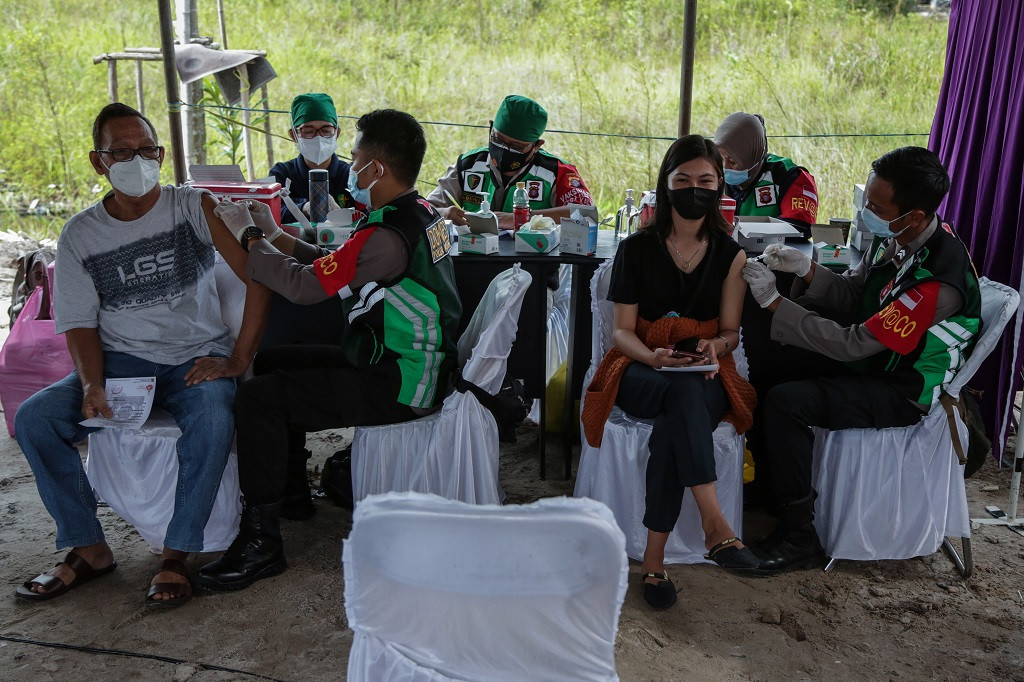Beware, COVID-19 is penetrating Indonesia's hinterlands
The current reports of COVID-19 cases from the nation's remote areas are believed to be the tip of the iceberg because of limited testing and tracing.
Change Size

W
hile we are currently seeing several signs of progress in reducing the infection rate and fatalities related to COVID-19 in densely populated cities in Java and Bali, we are also witnessing worrying indicators that the pandemic is increasingly penetrating Indonesia's hinterlands.
In the last few weeks, mainstream and social media have disseminated reports about surges in the number of people, including in several indigenous communities, suffering or dying from COVID-19 in remote areas of Sumatra, Kalimantan, Sulawesi, Maluku and Papua.
And as if to add insult to injury, the vaccination rollout in far-flung regions lags far behind Java and Bali, which have apparently been given the priority.
Several health authorities and local government officials in remote regions have expressed worries about the limited capacity of their health system to contain the spread of COVID-19, which could lead to higher infection and fatality rates than in Java and Bali. Community health centers and regional hospitals in outlying areas can hardly conduct testing, tracing and treatment for those with severe symptoms.
They are desperately asking help from the national and provincial governments. The bed occupancy rate in several regional hospitals in remote areas or on small islands is worrying, as is the limited availability of essential resources such as PCR testing, medicines, oxygen, ventilators and human resources, including doctors, nurses and medical staff with sufficient laboratory skills and tracing capabilities. Moreover, the current reports of COVID-19 cases from these remote areas are believed to be the tip of the iceberg because of limited testing and tracing.
Ironically, these gloomy realities in many ways resemble those of 100 years ago, when the Spanish flu penetrated the archipelago's hinterlands. Several publications at the time reported that the Spanish flu had not only hit many of the archipelago’s big cities, such as Batavia, Bandung, Surabaya, Medan and Makassar, but had also claimed many lives in remote areas.
Take Toraja, the hinterland of South Sulawesi, as an example. Several historians recorded that hundreds or even thousands of Toraja people died of Spanish flu, even though Toraja is located quite far to Makassar’s north. Even today, thanks to strong oral history, many Torajans still remember the local name of the catastrophe: ra'ba biang.
The word Ra'ba biang illustrates the speed of the transmission and its severe impacts, particularly deaths. Ra'ba biang literally describes the destroyed plants or grasses resulting from a typhoon or comparable external power.
The Bugis in South Sulawesi have a comparable local name for the epidemic, sai, while the Makassarese, another major ethnic group in the region, call it garring pua. Both local names, like ra'ba biang, represent the huge risk of a disease that may take numerous lives in a short period of time.
The devastating impacts of the Spanish flu were also related to the slow and uncoordinated responses of the Dutch colonial government at the time, as well as the weak health system. One of our forgotten founding fathers, Dr. Abdul Rivai, among the brightest and first alumni of the colonial-era STOVIA medical school in Batavia and among the first local medical doctors to finish a PhD at a European university, who was also a Volskraad (colonial parliament) member at the time, strongly criticized the colonial government’s inadequate response to the disease.
So what can be done to mitigate COVID-19 contagion and fatalities in the nation’s hinterlands?
The most pressing need is facilitating fast and coordinated cooperation among national, provincial and local governments to assist and empower local health systems, particularly community health centers (Puskesmas) and regional hospitals, to increase the capacity for testing, tracing and to strengthen compliance with health protocols. Social and financial support to enable local people to apply protective behaviors should be promptly delivered.
Additionally, national, provincial and local governments must empower regional hospitals with essential tools, facilities and resources to assist patients with severe symptoms. The availability of key human resources such as doctors and nurses and essential tools such as medicines, oxygen, ventilators and well-staffed laboratory facilities, are highly necessary.
Puskesmas and regional hospitals play a key role in the fight against COVID-19 in the hinterland. Therefore, they deserve adequate and consistent support from both national and regional governments. Hopefully, the government has learned the most important lesson from COVID-19, which is the urgent need for stronger health systems across the country.
Support from the private sector and civil society is also highly valuable considering the limitation of the government's resources. There is a high possibility that COVID-19 will not be the last pandemic in our lives, and therefore, we need to be better prepared.
The writer is a senior lecturer at the Faculty of Public Health, Hasanuddin University, and a senior fellow at the Partnership for Australia-Indonesia Research (PAIR).









